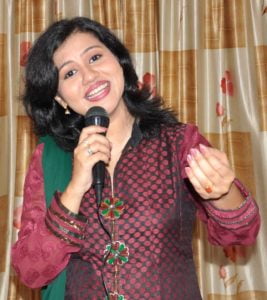“You are destined to go very far in the field of music. You are very dedicated in your pursuit of music. Please keep it up.” Legendary singer Manna Dey had said this to budding singer Nazia Alam years ago when they performed together.
True to his prophesy, the prodigious daughter of legendary singer Sikandar Alam has carved a niche for herself at a relatively young age. From being a finalist at the immensely popular SaReGaMa reality show as a teenager to the winner of India’s coveted Ustad Bismillah Khan Yuva Prativa Puraskar for music, Nazia’s saga of success has been an inspiration for many aspiring artistes.
Excerpts from an interview:
The very first question that I am tempted to ask you is about your name. Who decided that you should be named as Nazia?
My mother. Nazia Hassan was a singing sensation then and I guess Ma was inspired.
Was music your natural choice as a career?
Yes. I had an inclination towards music since childhood. So I went with the flow. Music happened to me naturally.

You were brilliant in academics too. Did you ever think of a settled career than the struggling and challenging life of a singer?
Yes, I was preparing for civil services along with my training in music though my parents always encouraged me to become a singer. However, it was my professor’s remarks that changed my plan. “Tume jadi kou district re collector hei basiba tahale Odisha re sangita kariba kie” (Who would serve music in Odisha if you become a district collector) — these words from him made me think what my parents had already thought about me.
Many a times, great musicians discourage their children to take up music as a career as they had struggled and suffered. How was it in your case?
My parents always encouraged me to become an artist only. No doubt that music in Odisha is a challenging career but I was not only blessed with the genes, but I also had the responsibility to carry forward a legacy. So, there was no second thought. There are very few people in this world who pursue their passion as their profession. I consider myself fortunate as being one among them.
Please share with us your experience of being the SaReGaMa finalist. Who were the judges?
It was during 1997 to 2001 that I got selected in two national-level singing competitions —SaReGaMa and Meri Awaz Suno. There were not so many reality shows during that time like we see today. So it was considered a big thing to be seen on those platforms.
These shows were hosted by Sonu Nigam and Anu Kapoor. Both these shows shortlisted one singer from each state, who was then called to Mumbai for the finals. I had the opportunity to meet and interact with some very popular music directors and singers from Bollywood like Shankar Mahadevan, Anu Mallick, Alka Yagnik, Raju Singh, Farha Khan who had judged me.
We don’t find you in Odia film industry as a playback singer. Any specific reason?
I got my first offer for the Odia film ‘I Love You’ from music director Swaroop Nayak in 2002. But I could not avail it then as I was on my first USA tour with my father. Since classical music has always been my first love and I also gained recognition for classical genre, I continued enjoying the depth of it. So my focus shifted to Odissi music. Since I sing all types of songs, I am open to sing for Odia movies. And I look forward to it too.
Talents often migrate to bigger cities for career-growth. Did you not wish to do so?
Yes, I wished and I explored as well. To expand my horizon, I started pursuing higher training in Hindustani classical music from Ustad Mashqoor Ali Khan Saheb at ITC Sangeet Research Academy in Kolkata for six years. But, being based in Odisha made me happier as my mother and my music are here. Moreover, I always wished to make Odisha known outside the state through my music. I believe, I am able to do it.
You were the first Odissi singer to claim Ustad Bismillah Khan Yuva Prativa Puraskar. Ten years have passed since then and Odissi music is yet to get the classical status. What’s your view on this issue?
Due publicity and promotion are required to achieve this. There are very few national-level music festivals where Odissi music is being presented. At the individual level, it is the responsibility of every Odissi vocalist and teacher to spread this rich music by maintaining the tradition and its unique style of rendition in their presentations.
I am confident that Odissi music will get its classical status soon just like our Odia language got it. Our government has already taken the initiative in this direction.
Your father’s contribution to Odisha’s culture has been exemplary. Do you think he received the recognition he deserved from Odisha?
Yes.



